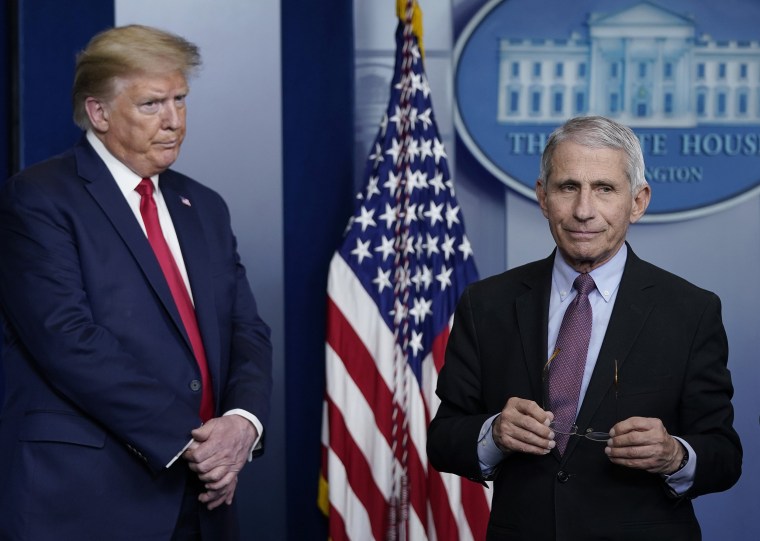The NIH's Anthony Fauci fielded questions about schools during a Senate hearing this week, and the doctor sounded a note of caution. "We just have to see on a step-by-step basis, as we get into the period of time with the fall about reopening the schools, exactly where we will be in the dynamics of the outbreak," Fauci explained.
Evidently, the comments didn't satisfy Donald Trump.
"I was surprised by his answer, actually, because, you know, to me it's not an acceptable answer, especially when it comes to schools," Trump said during a meeting Wednesday afternoon with North Dakota Gov. Doug Burgum and Colorado Gov. Jared Polis in the Cabinet Room of the White House. "He wants to play all sides of the equation," Trump said of Fauci.
It's not exactly a secret that the president is desperate to reopen the country, regardless of the risks of the assessments from public-health experts. But over the last couple of days, Trump seems especially interested in opening the doors of shuttered schools.
At one point during yesterday's White House event, for example, the president said the coronavirus has "had very little impact on young people." He added, "It's had very little impact on young people.... Again, it's had very little impact on young people."
Trump wasn't reading from a malfunctioning teleprompter; he simply kept repeating the line as if it were proof that state and local officials could obviously "open their schools."
The Republican added again this morning, during a Fox Business interview, "We have to open our schools. Young people are little affected by this."
The president appears to have no use for expertise, but the authorities have made a few relevant details clear. First, to believe that children are somehow immune to the ill effects of the coronavirus is at odds with the latest evidence. The New York Times reported overnight, for example, on "a serious and potentially deadly inflammatory condition," called Kawasaki disease, affecting children who contract the virus.
Second, the vast majority of children don't live in their schools; they go home at the end of the day and interact with adults who are more vulnerable. What's more, while they're at school, they also interact with school teachers, administrators, and staff. Trump suggested yesterday that some educators may want to avoid schools "for a little while longer," though he didn't elaborate how classrooms would function without them.
In reference to some educators, the president added, "I think they ought to take it easy for another few weeks -- five weeks, four weeks, who knows. Whatever it may be."
Thank goodness we have a wonky, detail-oriented leader who's clearly given issues like these a lot of thought.
But even putting these relevant details aside, let's not brush past the fact that Trump has convinced himself that he, and not Anthony Fauci, understands the responsible road ahead.
For what it's worth, Fauci has spent decades as one of the nation's most respected immunologists. Trump was a personality on a reality show and recently expressed interest in research on injecting people with disinfectants. It's not a tough call whose judgment in the midst of a pandemic has more value.
